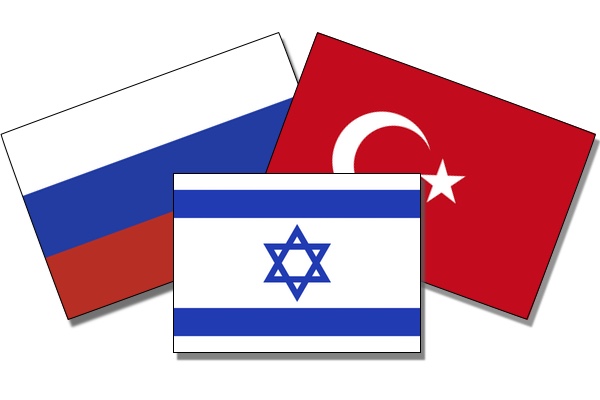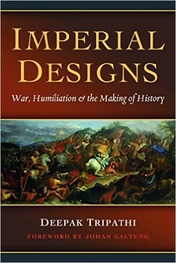What’s Going on with Russia and Turkey?

Two recent events amid the turmoil in the Middle East are of particular interest, for they illustrate the complexity of the region’s politics, and shed light on the players’ motives as they act. On November 24, Turkey shot down a Russian aircraft flying a bombing mission against ISIS targets in Syria. The Turkish government said that the plane was one of two Su-24 bombers which had violated the country’s airspace for 17 seconds, and had been warned ten times before being shot down. Was the Turkish action taken in the heat of the moment or was it part of a calculated move is difficult to know for certain. However, the incident certainly sparked furious reactions from Moscow and Ankara. President Putin called the Turkish action a “stab in the back.” President Erdogan warned Russia not to “play with fire.”
 A few days later,
Israel’s defense minister Moshe Yaalon told Israel Radio that a
Russian jet recently breached Israeli airspace by “mistake,” but
was not shot down. Yaalon said that Russian planes “don’t intend
to attack us” and therefore there is “no need to shoot them
down.” When the Russians were informed, the plane, which had
entered about a mile into Israel, was said to have turned back.
A few days later,
Israel’s defense minister Moshe Yaalon told Israel Radio that a
Russian jet recently breached Israeli airspace by “mistake,” but
was not shot down. Yaalon said that Russian planes “don’t intend
to attack us” and therefore there is “no need to shoot them
down.” When the Russians were informed, the plane, which had
entered about a mile into Israel, was said to have turned back.
These incidents raise intriguing questions about relations between all three countries, and why Israel and Turkey responded so differently to brief “violations” of their territory by Russian aircraft. They provide insights into the true situation in the Middle East. They explain competing, as well as common interests, of various players in the region. They also suggest that a degree of order exists even in a seemingly chaotic set of circumstances.
Deep suspicion, even hostility, afflicted Turkish-Syrian relations since the beginning of the Cold War until the 1990s, well after the dissolution of the Soviet Union. The reasons were threefold: Turkey’s membership of NATO and Syria’s alliance with the Soviets; Syria’s Baathist ruler Hafez al-Assad’s support for the Kurdish Workers’ Party (PKK) fighting for independence from Turkey; historical baggage of Ottoman rule between the early sixteenth century and World War I.
Following the defeat of the Ottoman Empire in WW1, and the creation of a new Turkey by its founder Mustafa Kamal Ataturk, successive Turkish governments had seen the country as more European than Middle Eastern. Turkey’s desire to become a full member of the European Union seemed logical. However, reluctance among some EU members caused long delays. Often cited obstacles were Turkey’s 1974 invasion of Cyprus, and creation of the Turkish Republic of Northern Cyprus, recognized only by Ankara. The end of the cold war, meanwhile, opened the way for improvement in relations with Russia and Syria. Disenchantment over the EU membership issue, and the rise of the governing Justice and Development Party originating from the Islamist tradition, renewed Turkey’s interest in the Middle East.
More than 95 percent of Turkey’s population is Muslim, mostly Sunni. Demography is, therefore, an important determinant in the country’s domestic and foreign policies. When President Hafez al-Assad of Syria expelled the Kurdish separatist leader Abdullah Ocalan after sheltering him for 20 years, the stage was set for a dramatic improvement in relations between Ankara and Damascus. Under the leadership of Erdogan and al-Assad, military cooperation and formal trading ties were established; Erdogan helped Assad’s visit to France in 2005, and talks between Syria and Israel were held under Turkish mediation in 2008. Syria was brought in from the cold.
Relations between Israel and Turkey had historically been good. Ankara recognized the State of Israel in 1949, but remained mindful of its ties with the Muslim world. Diplomatic relations with Israel were downgraded during the 1956 Suez Crisis – a conflict in which Israel, France and Britain launched an unsuccessful invasion of Egypt to regain control of the Suez Canal and remove President Gamal Abdel Nasser, who had nationalized Suez. Half a century later, a major crisis developed in Israeli-Turkish relations following a series of events which began after the landslide victory of Erdogan’s party in 2002.
Turkey condemned the Israeli assassination of the blind Palestinian cleric Sheikh Ahmed Yassin in 2004; Erdogan denounced Israel’s 2008-9 bombing of Gaza as “state terror” and said Israel will reap what it sows; Israel, in turn, rejected Turkish mediation in talks with Syria; then in May 2010, Israeli defense forces attacked the “Gaza Freedom Flotilla” carrying humanitarian supplies, killing nine activists, including eight Turkish nationals and one Turkish-American. The flotilla had been organized by Turkey’s Foundation for Human Rights and Freedoms and Humanitarian Relief (IHH).
These events caused a sharp deterioration in Turkish-Israeli relations. However, Ankara remained pragmatic. When asked why his government doesn’t break off relations with Israel, Prime Minister Erdogan replied: “We are running the Turkish Republic, not a grocery store.” Turkey is an overwhelmingly Muslim country. Its government is of an Islamic and conservative disposition. However, the country is also a member of the Western alliance. Ankara’s ambition to become a full member of the European Union have been set back for now, but Turkey and the European Union remain important for each other. Turkey, a leading NATO member, and Israel, America’s most important ally, can hardly be enemies no matter how serious their differences about Middle East politics.
The outbreak of civil war in Syria in 2011 made Ankara reassess its developing ties with the Assad regime. Erdogan’s decision to switch sides and back the Syrian opposition was a calculated move based on a number of considerations, none without risks. In the final analysis, however, Erdogan and his party decided that Turkey had more to lose by continuing its association with the Assad regime. In the light of how long the Syrian regime has lasted, the rise of ISIS in Syria and Iraq, and the Russian intervention in Syria, that calculation is open to question.
